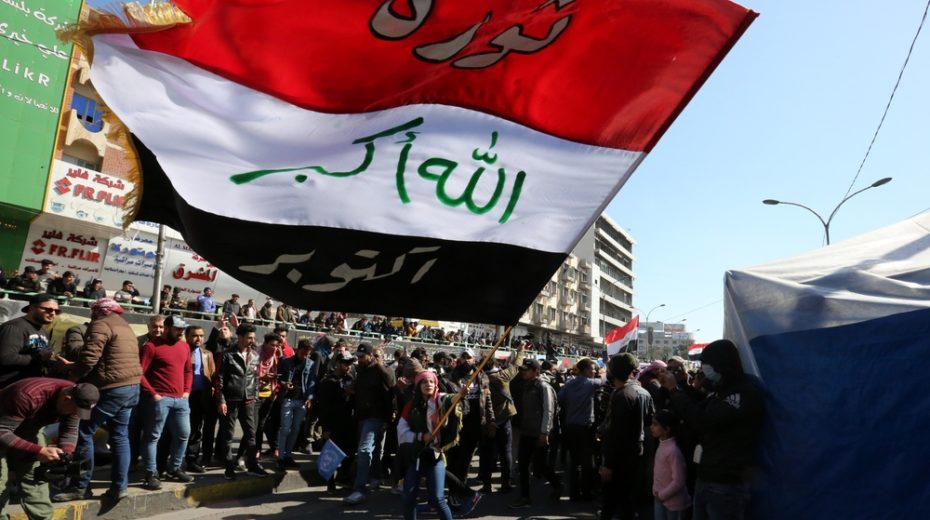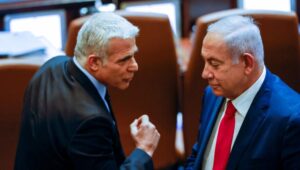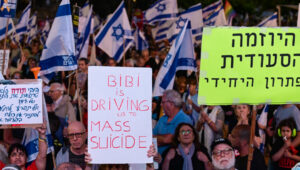The Iranian regime is waging a systematic war of repression against the Iraqi people. After decades of foreign interference, Tehran has wrested control over much of the Iraqi state, using its extensive influence to sway key policymaking decisions and embed pro-Iran agents into positions of institutional authority. As U.S. sources have long pointed out, the Iraqi economy has been intentionally stymied by Tehran in order to both concertize existing dependencies on Iranian exports and eliminate Iraq as a geo-strategic competitor.
The pursuit of these strategies has culminated in the most recent and brutal form of Iranian aggression in Iraq–outright violence and human rights abuse directed at Iraqi citizens.
Iran’s true face was first revealed in the wake of the so-called October Revolution, an ongoing wave of anti-government and anti-Iran demonstrations that is currently sweeping across Iraq. The country-wide spate of anti-government protests constitutes Iraq’s largest ongoing episode of civil unrest since the fall of Saddam Hussein.
From the moment organized protesters took to the streets, Iran has repeatedly used its proxies in an effort to quash the movement. In the first week of protests, reports emerged of Iran-backed militias deploying snipers on Baghdad rooftops.
There is no doubt that Iran-funded enforcers were responsible for the killing and maiming of hundreds of defenseless protesters. Unfortunately, Iran’s foreign proxies are not the only actors complicit in the brutal repression of Iraqi citizens. In a perverse miscarriage of justice, Iran’s efforts to curb democratic activism in Iraq have also been enabled and sometimes even carried out by Iraqi government state security forces.
Since the initial bout of violence, Iraqi security forces and Iranian proxies have been implicated in dozens of violent encounters with protesters. One incident that caught the ire of the United Nations (UN) was a February 14 attack on activists. According to credible accounts received by the UN, gunmen armed with hunting rifles began targeting demonstrators as they peacefully marched along a pre-designated route. At least fifty people were injured at the event.
These events were far from isolated. Two weeks prior, Iraq’s major urban centers were the backdrop to a government-coordinated effort to violently disperse peaceful activists. An observer from the Human Rights Watch (HRW) later commented on these actions, reporting that security forces heedlessly burned activist tents and dispersed tightly packed demonstrators with anti-riot weapons as well as live ammunition. Witnesses across Iraq relayed similar scenes, with many descriptions noting that the attackers arrived in government military vehicles despite wearing unmarked uniforms. On January 25, activists in Basra’s Bahria Square were beaten and detained by masked members of Iraq’s pseudo-official militia security forces. Follow-up social media posts showed the attackers using four small bulldozers to demolish the tents set up by protesters.
In some cases, violence between protesters and pro-Iran factions has veered into pitched firefights. Take the January 26 protest that took place near Baghdad’s Tahrir Square. After crowds of activists gathered at the historic site, several cars packed with attackers descended on the demonstration, opening fire with AK-47s and other long-range weapons. Many began to launch tear gas cartridges at the crowd. “I saw them shoot two protesters in the legs, drag some of the protesters on the ground and load four into their vehicles,” recalled one demonstrator.
Despite their bravery and tenacity, Iraq’s youth-majority protesters stand little chance against veteran militia fighters with government-supplied military-grade weapons. Over the course of their protests, Iraqi teenagers and students have been subjected to everything from brutal beatings on the street to lethal instances of live-fire shooting.
As the government’s brutal crackdown continues, the few human rights still available to protesters are now being stripped away. Security forces, working in conjunction with Iranian proxies, are actively depriving Iraqi citizens of basic freedoms of assembly and expression. Women’s rights have been chipped away by persistent abuses, along with the right of access to basic utilities, including sanitary water, reliable electricity and accessible health care.
To prevent a humanitarian disaster and avert further human rights abuses in Iraq, the international community must do more to dislodge Tehran’s invasive political, economic, and military influence over Baghdad.
To accomplish this goal, domestic stakeholders must pave the way for the emergence of an Iraqi political environment that prioritizes Iraq’s sovereignty and domestic interests over Tehran’s hegemonic regional ambitions. The pro-sovereignty movement in Iraq, a collection of liberal-minded parties that have growing cachet within the international community, has already demonstrated how ordinary Iraqis can stand against the country’s corrupt, Iran-aligned ruling elite.
Although far from unified, anti-government factions all espouse a similar message, one revolving around the rejection of what many protest leaders have called political clientelism, or in other words, the favoring of foreign interests at the expense of Iraq’s citizenry. Groups operating under the umbrella organization of the Sovereignty Alliance for Iraq-like the Najafa Brothers, the National Independent Iraqi Front, and the National Wisdom Movement-equally loath the fact that so many of Iraq’s public officials are beholden to foreign powers, which they all consider a “betrayal by the political elite.”
If stakeholders in Iraq want to see real internal change, the only viable path forward is to actively promote and support the broader pro-sovereignty movement. By elevating the influence of pro-sovereignty factions, Iraq’s subordination and oppression at the hands of malicious and corrupt actors–all of whom are at the beck and call of Iranian Ayatollahs–can finally be put to an end.















